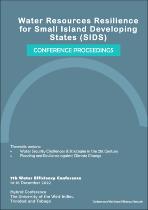JavaScript is disabled for your browser. Some features of this site may not work without it.
- ResearchSpace
- →
- Research Publications/Outputs
- →
- Conference Publications
- →
- View Item
| dc.contributor.author |
Gibberd, Jeremy T

|
|
| dc.date.accessioned | 2023-02-26T20:20:26Z | |
| dc.date.available | 2023-02-26T20:20:26Z | |
| dc.date.issued | 2022-12 | |
| dc.identifier.citation | Gibberd, J.T. 2022. Rainwater harvesting design approaches. http://hdl.handle.net/10204/12630 . | en_ZA |
| dc.identifier.uri | http://hdl.handle.net/10204/12630 | |
| dc.description.abstract | Different approaches have been developed to design rainwater harvesting systems. However, these have not been widely applied in schools and are not well understood. This paper presents findings from a study in which different rainwater water harvesting design approaches are selected and applied to a case study school. The approaches are introduced and the results of their application to the case study school are critically evaluated. The study finds that the methodologies have different strengths and weaknesses. A critical analysis of the results indicates that one approach may be too simplistic and provide misleading results. Another approach does not provide adequate outputs to fully design rainwater harvesting systems. A third methodology is complex to apply and requires data that is difficult to obtain. Based on the study, recommendations are made on how the selected approaches can be improved to enable these to be used more easily to design school rainwater harvesting systems. | en_US |
| dc.format | Fulltext | en_US |
| dc.language.iso | en | en_US |
| dc.relation.uri | https://www.watefnetwork.co.uk/files/pages/WATEFCON%202022_Proceedings_final.pdf | en_US |
| dc.source | Water Efficiency Conference, Trinidad & Tobago, 14-16 December 2022 | en_US |
| dc.subject | Schools | en_US |
| dc.subject | Rainwater harvesting | en_US |
| dc.subject | Rainwater harvesting modelling | en_US |
| dc.subject | Rainwater harvesting calculator | en_US |
| dc.title | Rainwater harvesting design approaches | en_US |
| dc.type | Conference Presentation | en_US |
| dc.description.pages | 125-133 | en_US |
| dc.description.note | All rights reserved. The Conference Proceedings are published online, free of cost. No part of this publication may be reproduced, stored in retrieval system or transmitted in any form or by any means, electronic, mechanical, photocopying, recording or otherwise, without the express attribution of the copyright holder. Applications pertaining to specific papers should be directed to the corresponding author of the paper. Authors of papers in these proceedings are authorised to use and self-archive their own material freely, provided it is expressly cited as part of this proceedings. No other form of archiving is permitted without consent. | en_US |
| dc.description.cluster | Smart Places | en_US |
| dc.description.impactarea | Infrastructure Innovation | en_US |
| dc.identifier.apacitation | Gibberd, J. T. (2022). Rainwater harvesting design approaches. http://hdl.handle.net/10204/12630 | en_ZA |
| dc.identifier.chicagocitation | Gibberd, Jeremy T. "Rainwater harvesting design approaches." <i>Water Efficiency Conference, Trinidad & Tobago, 14-16 December 2022</i> (2022): http://hdl.handle.net/10204/12630 | en_ZA |
| dc.identifier.vancouvercitation | Gibberd JT, Rainwater harvesting design approaches; 2022. http://hdl.handle.net/10204/12630 . | en_ZA |
| dc.identifier.ris | TY - Conference Presentation AU - Gibberd, Jeremy T AB - Different approaches have been developed to design rainwater harvesting systems. However, these have not been widely applied in schools and are not well understood. This paper presents findings from a study in which different rainwater water harvesting design approaches are selected and applied to a case study school. The approaches are introduced and the results of their application to the case study school are critically evaluated. The study finds that the methodologies have different strengths and weaknesses. A critical analysis of the results indicates that one approach may be too simplistic and provide misleading results. Another approach does not provide adequate outputs to fully design rainwater harvesting systems. A third methodology is complex to apply and requires data that is difficult to obtain. Based on the study, recommendations are made on how the selected approaches can be improved to enable these to be used more easily to design school rainwater harvesting systems. DA - 2022-12 DB - ResearchSpace DP - CSIR J1 - Water Efficiency Conference, Trinidad & Tobago, 14-16 December 2022 KW - Schools KW - Rainwater harvesting KW - Rainwater harvesting modelling KW - Rainwater harvesting calculator LK - https://researchspace.csir.co.za PY - 2022 T1 - Rainwater harvesting design approaches TI - Rainwater harvesting design approaches UR - http://hdl.handle.net/10204/12630 ER - | en_ZA |
| dc.identifier.worklist | 26426 | en_US |






